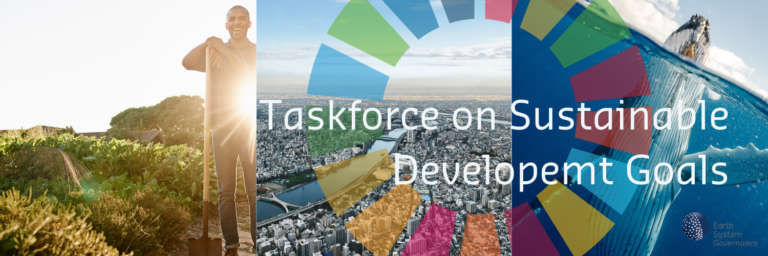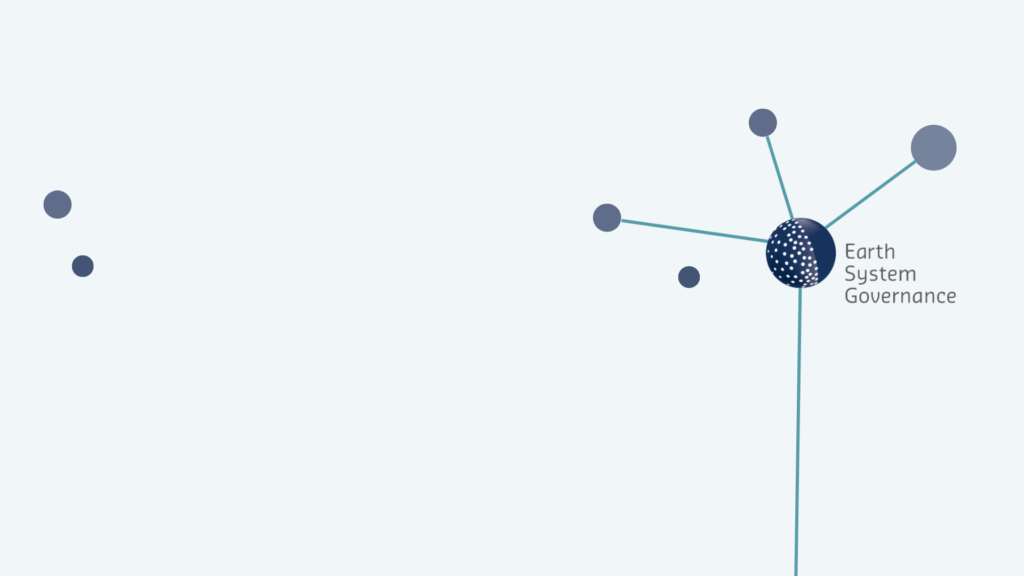At the mid-way point of Sustainable Development Goals (SDG) implementation, the SDG Progress Report by the UN Secretary General indicates that the world is off-track to reach the global goals by 2030. As the Global Sustainable Development Report (2023) highlights, global governance actors everywhere are therefore required to refocus and accelerate their efforts and utilize the potential of the High-level Political Forum (HLPF) on Sustainable Development in July, and the SDG Summit in September.
As part of a Taskforce-wide series, the Earth System Governance Taskforce on the Sustainable Development Goals’ Working Group on Global Governance organized a first roundtable on the theme of “Promises and pitfalls of accelerating SDG implementation in global governance”. A panel of experts reflected on where they see change in global governance, and under what conditions acceleration is possible to implement transformative changes up to 2030 and beyond. The discussion identified many enabling and constraining factors for accelerating current ambition levels to implement the global goals.

Prof. Pamela Chasek pointed to the lack of public attention to the SDGs, due to ongoing crises and conflicts, such as COVID, the illegal invasion of Ukraine by Russia, climate change and ongoing issue-specific environmental intergovernmental negotiations. While these are all linked to the SDGs, the integrated nature of the SDGs is not discussed (sufficiently) in other global fora. As the multilateral system and the SDGs face multiple paradoxes, renewed media attention, more educational materials (following the example of Japan for example), a strong involvement of the scientific community, and an integrative approach to the SDGs offer opportunities to accelerate implementation towards 2030.


Dr. Marianne Beisheim highlighted that leaving implementation details in the 2030 Agenda deliberatively open and vague is backfiring. At the same time, deep geopolitical tensions are threatening reform-oriented agendas in global governance, such as strengthening the HLPF, or preparing the Summit of the Future. Scrutinizing national implementation further, bringing in local momentum and unpacking what the often-criticized lack of political will refers to, are important lessons to learn and should inform steps to accelerate transformative shifts towards 2030.
Maya Bogers discussed the uptake and integrative nature of the SDGs among international organizations. While the SDGs are used more, this has not led to more policy integration or increased collaboration, which remains siloed and sectorally focused. Economically focused SDGs are prioritized over issues related to land, oceans or inequality. To accelerate towards 2030, more collaboration across policy domains, and mechanisms to ensure no goals fall behind are necessary. The HLPF can offer more room to discuss the links between the SDGs. We might have to think about soft forms of prioritization, especially for goals falling behind key (to be defined) thresholds.


Dr. Somya Joshi presented enabling and constraining factors emerging technologies such as artificial intelligence offer to implementing the 2030 Agenda and the SDGs. On the one hand, they can help with regard to measurement, or understanding synergies and trade-offs. On the other hand, they can negatively affect equity and power, and can be used to digress on the implementation of the SDGs. When we talk about accelerating the impact of the SDGs, the gap between local- and global-scale solutions requires shifting from scaling technologies, behaviors, and projects to building and activating the agency and capacities of individuals and collectives to transform systems and cultures at scale. Here we need to look at the work of Karen O’ Brien et al 2023 [1], where they talk about a fractal approach to scaling up sustainability impacts.
David O’Connor stressed the need to unpack political will and identify where key decisions get made to unlock progress towards 2030. Financing is crucial in this regard, and as the more integrated nature of the 2030 Agenda and the SDGs has made its way into international finance institutions, this needs to be addressed at the upcoming SDG Summit or the Summit of the Future. At the same time, a shift towards more coalitions-based multilateralism might be necessary, while balanced local approaches and compensation of losers are important for ensuring transformative shifts towards 2030.

During the discussion, the question of political will and attention for the SDGs was further explored. Prof. Pamela Chasek noted that for attention to be gained for the SDGs, it might be necessary to look a little more carefully at what is being done in the issue areas covered by the SDGs, and the areas where success can be observed, which could bolster attention for the agenda. Maya Bogers noted that garnering more attention for the integrated nature of the SDGs might also be stimulated by a novel visualization of the SDGs, more closely resembling a network or spiderweb, rather than the current set of individual goals in blocks or the famous circle.
Dr. Somya Joshi emphasized that for positive, integrated acceleration, AI might hold some potential, as studies are emerging that use AI to understand the links between NDCs and SDGs, providing a mapping of overlap, and forming the basis for an integrated assessment.
At the national level, where integrated approaches need to be implemented, Dr. Marianne Beisheim noted that VNRs have been a success in terms of the quantity of reports submitted. However, their quality needs to be improved, especially in evaluating how ongoing activities contribute to transformative shifts. We still know little about effective and efficient integrated policy-making at the national level.
When discussing the necessary means for actors to embark on this transformation in the first place, David O’Connor mentioned the need for the G20 to sufficiently step up its financing, and the general need for an increase in concessional finance, which goes hand in hand with addressing global public goods. An overarching factor, important for all countries, will be the ongoing UN General Assembly discussions on beyond GDP.
[1] *O’Brien, Karen, et al. “Fractal approaches to scaling transformations to sustainability.” Ambio (2023): 1-14
Recording
On the ESG Taskforce on Sustainable Development Goals
This Taskforce were launched in 2021 to provide a platform for promoting research on the SDGs. It now consists of around 100 scholars from more than 30 countries. If you are interested in joining the ESG Taskforce on the SDGs, please contact SDG@earthsystemgovernance.org.



